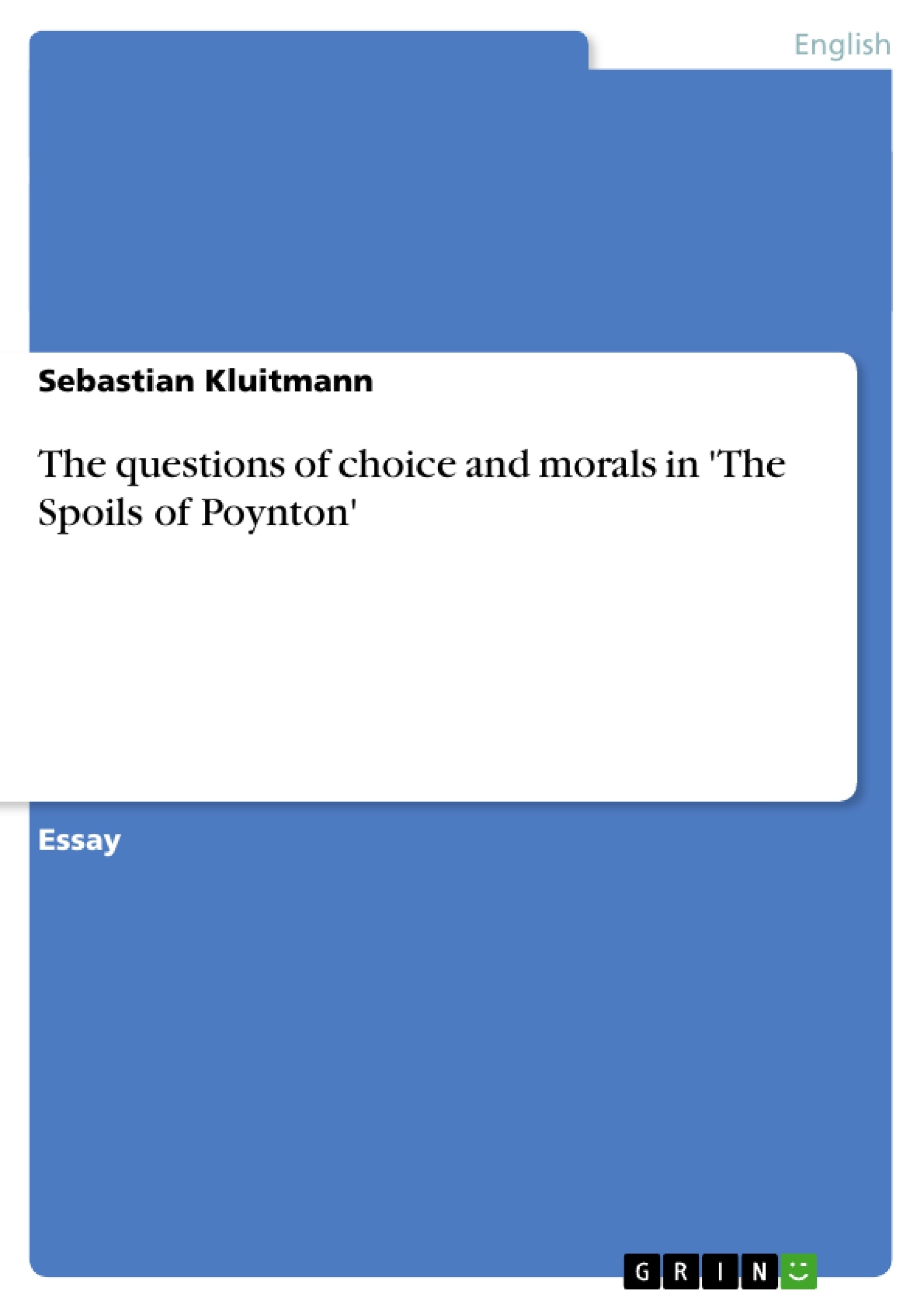Many of the critics writing about The Spoils of Poynton belong to one of two groups: “Either they take Fleda to be the heroine of the story in the traditional sense […] or they have taken her to be neurotic and self-deceiving, pathologically fearful of sex, and contributing more harm than balm to the domestic row between the Gereths” (Lodge. Introduction: 5). Both ways of interpretation actually imply that Fleda is indeed the ‘free spirit’ James intended. This view is particularly clear in the wikipedia article which states that “Fleda Vetch has earned most critics' sympathy for steering the right course through an almost impossible situation” (Wikipedia). The talk of a ‘right course’, however, reveals the author’s belief that Fleda has a choice. In the following, I want to argue that the exact opposite is the case. Fleda’s actions are not based on moral considerations but rather on existential necessities. Her freedom is therefore restricted to the realm of her imagination; all other decisions are dictated by the expectations of society. This is also the one unifying force to which all characters are subject and due to “his own disillusionment with existing English society” (Lyons. Social Vision: 64), James uses the comedy and irony in The Spoils of Poynton as a vessel to convey his social
criticism.
Inhaltsverzeichnis (Table of Contents)
- Introduction
- The unavailability of choice
- Morality and Fleda's increasing corruption
- Conclusion
Zielsetzung und Themenschwerpunkte (Objectives and Key Themes)
This essay aims to analyze the question of choice and morality in Henry James's The Spoils of Poynton by examining how the characters' actions are influenced by societal expectations and their inability to exercise true free will. The essay argues that Fleda Vetch, the protagonist, is not a free spirit as many critics claim, but rather is caught in a web of social obligations and existential necessities, leaving her choices limited and her morality compromised.
- The influence of social expectations and societal pressures on individual choices
- The role of morality and ethical considerations in a conflict-ridden environment
- The portrayal of the upper class and their obsession with possessions and status
- The theme of dependence and the limitations it imposes on personal agency
- James's social critique of Victorian society through the use of irony and comedy
Zusammenfassung der Kapitel (Chapter Summaries)
The Introduction examines conflicting interpretations of Fleda Vetch as either a heroine or a flawed character, suggesting that both perspectives imply her freedom of choice. The essay counters this by arguing that Fleda's actions are determined by societal pressures and existential necessities, limiting her agency.
The first chapter, "The unavailability of choice," explores the social context that restricts Fleda's choices. The chapter delves into her precarious financial situation, her dependence on the generosity of others, and the social obligations that influence her actions. It highlights how her decision to live with Mrs. Gereth is not a true choice but rather a desperate attempt to secure her livelihood. The chapter further examines the theme of aestheticism and its impact on Fleda's relationships, analyzing how both Mrs. Gereth and the Brigstocks value possessions and prioritize social status.
Schlüsselwörter (Keywords)
The key terms and concepts in this essay include: social expectations, societal pressures, morality, choice, agency, dependence, aestheticism, upper class, Victorian society, social critique, irony, comedy, The Spoils of Poynton, Fleda Vetch, Henry James.
Frequently Asked Questions
What is the central argument regarding Fleda Vetch's "choice"?
The essay argues that contrary to many critics' views, Fleda Vetch does not actually have a free choice. Her decisions are dictated by existential necessities and the rigid expectations of Victorian society.
How does societal pressure influence the characters in 'The Spoils of Poynton'?
Societal pressure acts as a unifying force that restricts personal agency. Decisions regarding marriage and living arrangements are often desperate attempts to secure social status or livelihood rather than moral choices.
What is Henry James's social critique in this novel?
James uses comedy and irony to express his disillusionment with English society, particularly critiquing the upper class's obsession with material possessions (the "spoils") and their lack of true morality.
Is Fleda Vetch a traditional heroine?
While some see her as a heroine steering a "right course," this essay suggests she is increasingly corrupted by her environment and caught in an impossible situation where her freedom is limited to her imagination.
What role does aestheticism play in the story?
Aestheticism, or the love of beautiful objects, is a driving force for characters like Mrs. Gereth. This obsession often overrides human relationships and leads to the central domestic row over the house at Poynton.
How does Fleda's financial situation affect her agency?
Fleda's precarious financial position and dependence on the generosity of others make her vulnerable. This lack of economic independence is a key factor that prevents her from exercising true free will.
- Arbeit zitieren
- Sebastian Kluitmann (Autor:in), 2006, The questions of choice and morals in 'The Spoils of Poynton', München, GRIN Verlag, https://www.grin.com/document/86404



